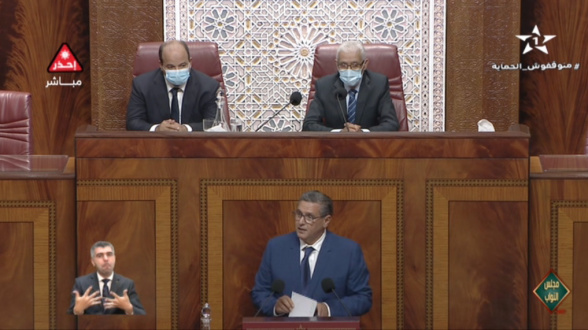
The head of government Aziz Akhannouch presented, Monday, the key aspects of the governmental program, including the successful exit from the crisis related to the Covid-19 pandemic, the consolidation of the democratic choice and the strengthening of its mechanisms, as well as the commitment to implementing the content of the new development model.
He also outlined the main commitments of his cabinet for the period 2021-2026.
Presenting the highlights of the government program, during a joint session of both Houses of Parliament, in accordance with the provisions of Article 88 of the Constitution, Akhannouch said that the definition of these major commitments is part of the application of the principle of accountability and aims to facilitate the monitoring and evaluation of the government’s performance.
Part of these commitments, he vowed the creation of at least one million net employment positions over the next five years, increasing the activity rate of women to more than 30% instead of 20% currently, the implementation of comprehensive social protection, the protection and expansion of the middle class, and the creation of socio-economic conditions conducive to the emergence of a middle agricultural class in the rural world.
He said these commitments also include the mobilization of all components to upgrade the education system, in order to place Morocco in the Top 60 of the best countries in the world in this area (contrary to the latest rankings in the majority of global indicators) and the implementation of the official character of the Amazigh language, including through the creation of a special fund endowed with one billion dirhams by 2025.
The government, he went on, is committed during the period of its mandate to gradually improve the macroeconomic balances of the Kingdom.
He considered that the popular will expressed during the municipal, regional and legislative elections of sept.8 has shown, through the voter turnout and the results of the polls, that the restoration of confidence in political action inevitably requires the presentation of options and credible social programs that address the real priorities of citizens.
